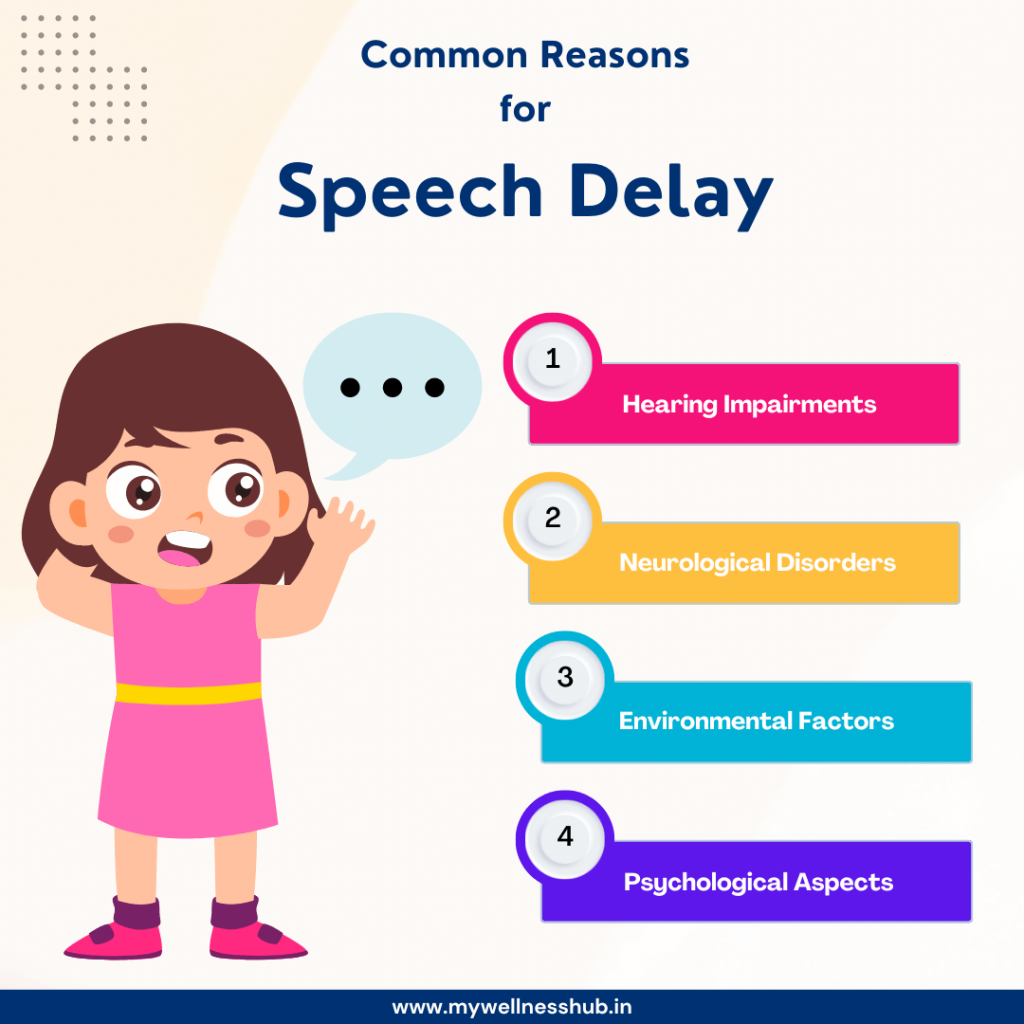Have you noticed that your 4-year-old is not speaking as much as other kids their age? You’re not alone.
Many parents feel concerned when their child isn’t hitting the expected speech milestones. This worry is natural, and understanding speech delays can be the first step in helping your child communicate better. Imagine the joy of hearing your child express themselves clearly, sharing their thoughts and feelings with you.
You’ll find out why speech delays happen and discover practical tips to support your child’s speech development. You’ll feel empowered with knowledge, knowing you’re giving your child the best chance to thrive. Stay with us as we explore the signs, causes, and solutions for speech delays in 4-year-olds.

Credit: iyurved.com
Common Causes
Speech delays in 4-year-olds can worry many parents. Various factors can influence a child’s speech development. Understanding these common causes can help identify the best approach for your child. Let’s explore some of these factors in detail.
Hearing Impairments
Hearing issues often affect speech development. Children with hearing problems might struggle to grasp sounds. This can lead to difficulties in forming words. Regular hearing tests can detect these impairments early. Early intervention may aid in improving speech skills.
Developmental Disorders
Some children experience developmental disorders impacting speech. Conditions like autism or intellectual disabilities can delay speech. These disorders affect communication skills and language understanding. Recognizing signs early can help in seeking professional guidance.
Environmental Factors
The environment plays a crucial role in speech development. Limited interaction with adults can slow language acquisition. Children learn by mimicking sounds and words. Engaging in conversations can help enrich their vocabulary. Providing a stimulating environment can enhance speech skills.
Neurological Conditions
Neurological conditions can also impact speech. Disorders affecting brain function may delay speech. These conditions can hinder communication and language processing. Early diagnosis and therapy can support speech improvement.

Credit: m.youtube.com
Signs To Watch For
Speech delays in children can be a source of concern for many parents. Understanding the signs to watch for in your 4-year-old is crucial for early intervention and support. These signs can vary, and noticing them can help you make informed decisions about seeking professional advice. Here are some specific indicators to keep an eye on, which might suggest your child is experiencing speech delays.
Limited Vocabulary
By age four, children typically have a vocabulary of around 1,000 words. If your child struggles to express themselves or uses fewer words than their peers, it may be a sign of a speech delay. My neighbor’s child, for instance, often replaced words with gestures, like pointing instead of saying “ball” or “juice”. This might indicate a need for language development support.
Difficulty Following Instructions
At four, children should follow simple instructions like “Put your toys away” or “Come sit here”. If your child seems to misunderstand or ignore requests, it might be more than just selective hearing. Imagine asking your child to fetch their shoes and seeing confusion instead of action. Could this be a sign of a speech comprehension issue?
Trouble With Pronunciation
Pronunciation is another key area where speech delays can manifest. You might notice your child has trouble saying words correctly or dropping sounds. For example, saying “wabbit” instead of “rabbit” is common, but consistent difficulty with sounds might need attention. How does your child handle new words or phrases? Listening carefully can provide insights.
Social Interaction Challenges
Speech delays can affect how a child interacts socially. They might avoid group play or struggle to make friends due to communication barriers. I recall a birthday party where a child sat quietly, unable to engage with others. Observing such behavior can be telling. How does your child respond in social settings? This might be an area where extra support could be beneficial.
In recognizing these signs, you open the door to early intervention and improved communication skills for your child. What steps might you take today to support your child’s speech development? Consider consulting with a pediatrician or speech therapist if any of these signs resonate with you.
Professional Assessments
Understanding speech delays in children can be challenging for parents. Professional assessments provide clarity and direction. These evaluations help identify the cause of speech delays. They also guide appropriate interventions. Let’s explore key assessments that experts recommend.
Speech-language Pathologist Evaluation
A speech-language pathologist (SLP) focuses on communication skills. They assess your child’s speech and language development. The SLP observes how your child understands and uses words. This evaluation identifies specific areas of difficulty. It is vital for creating a personalized therapy plan.
Hearing Tests
Hearing plays a critical role in speech development. Even mild hearing loss can affect speech. A hearing test checks if your child hears sounds clearly. Audiologists perform these tests using special equipment. Identifying hearing issues early can prevent further delays.
Developmental Screening
Developmental screening evaluates overall growth in children. It includes checking motor, social, and cognitive skills. Delays in these areas can impact speech development. Healthcare providers use simple tests to screen for developmental milestones. This screening helps in understanding the bigger picture of your child’s development.
Effective Solutions
Speech delays in 4-year-olds can be effectively addressed through early intervention and tailored speech therapy. Engaging children in interactive activities and fostering a language-rich environment greatly enhances their communication skills. Consistent practice and patience play crucial roles in supporting speech development.
Experiencing speech delays in your 4-year-old can be a challenging journey. However, there are effective solutions that can help your child catch up and thrive. Addressing speech delays early is crucial, and there are several strategies you can employ to support your child’s language development. Let’s explore some practical solutions that can make a difference in your child’s speech progress.
Speech Therapy
Speech therapy is one of the most effective ways to support a child with speech delays. A qualified speech therapist will assess your child’s needs and create a personalized plan. They use engaging activities tailored to your child’s interests, making learning fun and effective. Your involvement in sessions can enhance the benefits. Ask questions and learn techniques to practice at home. Consistency and patience are key to seeing progress in your child’s speech.
Interactive Reading
Reading with your child can greatly enhance their vocabulary and comprehension. Choose books with colorful pictures and simple texts. Pause to ask questions and encourage your child to describe what they see. Make reading a daily habit and incorporate it into bedtime routines. This not only strengthens language skills but also builds a love for reading. Have you tried letting your child pick their favorite book to read together?
Play-based Learning
Children learn best through play, making play-based learning a powerful tool. Incorporate games that involve naming objects, storytelling, or role-playing. Simple activities like playing with blocks or pretending to cook can spark conversations. Play allows your child to express themselves in a relaxed setting. It removes pressure and makes learning a joyful experience. How often do you engage in play with your child, using it as a learning opportunity?
Parental Involvement
Your role as a parent is pivotal in supporting your child’s speech development. Engage in regular conversations, even if your child isn’t speaking much yet. Narrate your activities and encourage responses. Celebrate small victories and progress, no matter how minor they seem. Your encouragement boosts your child’s confidence. What creative ways can you find to keep your child talking and engaged at home? Addressing speech delays requires a mix of professional help, interactive activities, and parental support. By integrating these solutions, you can create a nurturing environment for your child to develop their speech skills.
Home Strategies
Speech delays in 4-year-olds can concern many parents. Home strategies can help support language development. Simple, everyday actions can make a big difference. Parents play a key role in encouraging speech. Here are some effective strategies.
Encouraging Conversation
Ask open-ended questions during play. This invites your child to express themselves. Share stories about your day. This models conversational skills. Respond to your child’s comments. Show interest in their thoughts. Use simple sentences. Make them easy to understand. Praise efforts to communicate. This boosts their confidence.
Limiting Screen Time
Reduce screen time for your child. Excessive screen use can hinder speech development. Encourage activities that require talking. Reading together can help. Interactive games can be beneficial. Set specific times for screen use. This creates balance. Focus on engaging in real-life conversations.
Creating A Language-rich Environment
Surround your child with language. Use labels on everyday items. This helps them learn new words. Play word games during routine tasks. Sing songs and nursery rhymes. They are fun and educational. Read books daily. Choose stories that interest your child. Encourage them to describe pictures. This builds vocabulary. Keep the environment lively. Engage your child in activities that require dialogue.

Credit: www.mywellnesshub.in
When To Seek Help
Understanding when to seek help for speech delays is crucial. Parents often worry about their child’s speech development. Delays can be a normal part of growth. Yet, some signs may need professional attention. Recognizing these signs early can make a big difference. Intervention can improve communication skills effectively.
Persistent Delays
Watch for delays that persist over time. A 4-year-old should speak in full sentences. They should be understood by strangers most of the time. If speech is unclear or limited, it might indicate a delay. Regularly mispronouncing words or not forming sentences can signal concerns. Consistent struggles with language development shouldn’t be ignored.
Concerns From Educators
Teachers and educators can provide valuable insights. They observe children in social settings. They notice if a child struggles to communicate with peers. Teachers may express concerns if a child doesn’t engage in conversation. They often compare a child’s abilities with age-appropriate milestones. Feedback from educators can guide parents on speech development.
Advice From Pediatricians
Pediatricians are key resources for speech delay concerns. They can evaluate a child’s overall development. Regular check-ups help track progress. Pediatricians may refer parents to speech therapists. They assess whether delays are part of typical development. Professional advice ensures timely intervention. Parents can discuss any worries during appointments.
Frequently Asked Questions
Is It Normal For A Four Year Old To Have Speech Problems?
Yes, some four-year-olds may have speech problems. Speech development varies among children. Consult a pediatrician or speech therapist for guidance. Early intervention can improve communication skills.
Can A 4-year-old With Speech Delay Catch Up?
Yes, a 4-year-old with speech delay can catch up. Early intervention and consistent speech therapy help significantly. Encouraging communication through play and reading boosts progress. Consult a speech-language pathologist for personalized guidance.
What Is A Red Flag For Speech Delay?
A red flag for speech delay is a child not using simple words by age 2. Limited babbling or gesturing by 12 months also indicates concern. Difficulty understanding simple instructions can be a warning sign. Early intervention is crucial for addressing speech development issues effectively.
Is It Normal For A Four Year Old To Not Be Able To Talk?
A four-year-old not talking can be concerning. Speech delays might occur due to various reasons. Consult a pediatrician for advice. Early intervention often helps improve communication skills.
Conclusion
Speech delays in 4-year-olds can be concerning for parents. Early intervention plays a crucial role. Seeking professional advice is important. Therapists can provide helpful strategies. Encourage speech through daily activities. Read books together and have conversations. Celebrate small achievements and be patient.
Every child develops at their own pace. Support and understanding make a big difference. Stay informed and proactive in addressing concerns. Your involvement can lead to positive outcomes. Remember, you’re not alone in this journey. Reach out for support when needed.
Helping your child can bring rewarding progress. Keep hope alive and stay committed.

